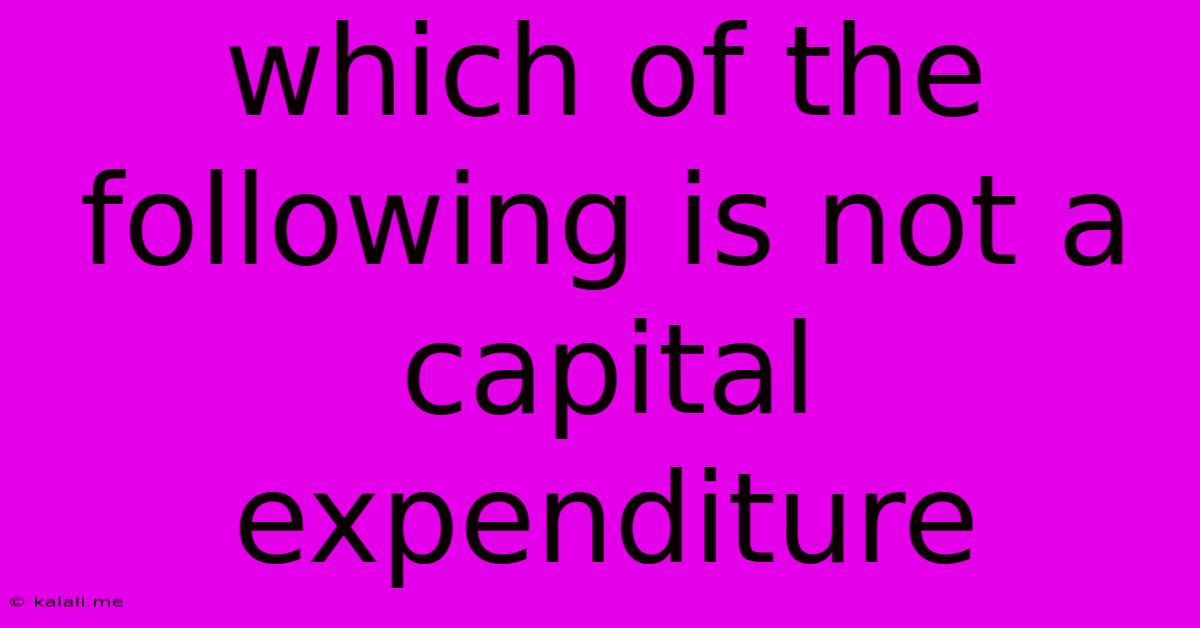Which Of The Following Is Not A Capital Expenditure
Kalali
Jun 16, 2025 · 3 min read

Table of Contents
Which of the Following is NOT a Capital Expenditure? Understanding CapEx vs. OpEx
This article will clarify the difference between capital expenditures (CapEx) and operating expenditures (OpEx), helping you understand which of several examples doesn't qualify as a capital expenditure. We'll explore the key characteristics of each, providing a clear definition and several illustrative examples to solidify your understanding. Knowing the difference is crucial for accurate financial reporting, budgeting, and long-term financial planning.
What is Capital Expenditure (CapEx)?
Capital expenditures represent investments in fixed assets that benefit a business over a long period, typically more than one year. These are significant purchases that improve or expand the company's operational capabilities. They increase the value of a company's assets and are reflected on the balance sheet. Think of them as investments that add value and longevity to the business. Examples include purchasing property, plant, and equipment (PP&E).
What is Operating Expenditure (OpEx)?
Operating expenditures are the day-to-day costs associated with running a business. These are expenses that are typically consumed within a single accounting period and are necessary for the continued operation of the business. OpEx appears on the income statement and affects profitability directly. They are essential for keeping the lights on and the business functioning.
Key Differences Between CapEx and OpEx:
| Feature | Capital Expenditure (CapEx) | Operating Expenditure (OpEx) |
|---|---|---|
| Nature | Long-term investment | Short-term expense |
| Life Span | More than one year | Typically within one year |
| Impact on Assets | Increases the value of assets on the balance sheet | Doesn't significantly increase the value of assets |
| Accounting Treatment | Capitalized on the balance sheet; depreciated over time | Expensed on the income statement in the period incurred |
| Examples | Purchasing land, buildings, equipment, major software upgrades | Rent, utilities, salaries, marketing, repairs, office supplies |
Identifying Which is NOT a Capital Expenditure:
Let's consider some examples and determine which one doesn't fit the definition of a capital expenditure:
- A. Purchasing a new factory building: This is a CapEx. It's a significant investment with a long lifespan.
- B. Replacing a broken window in the office: This is an OpEx. It's a minor repair maintaining the current asset, not improving or expanding it.
- C. Buying a new fleet of delivery trucks: This is a CapEx. These trucks will be used for several years, enhancing the company's delivery capacity.
- D. Annual software maintenance fees: This is an OpEx. It's an ongoing expense to keep existing software functional.
- E. Installing solar panels on the company roof: This is a CapEx. A significant investment in renewable energy, improving the company's infrastructure and reducing long-term energy costs.
Therefore, the answer is B. Replacing a broken window in the office. This is a routine maintenance expense that doesn't add significant value or extend the life of the building. It's a necessary cost to maintain the existing asset, making it an operating expense.
Conclusion:
Understanding the distinction between CapEx and OpEx is vital for sound financial management. By carefully categorizing expenditures, businesses can accurately forecast future cash flows, make informed investment decisions, and present a true picture of their financial health. Remember to always consider the longevity and value-adding nature of an expenditure to determine its proper classification. This knowledge is crucial for both small businesses and large corporations alike.
Latest Posts
Latest Posts
-
What Is The Prime Factorization Of 68
Jun 16, 2025
-
How To Find A Midpoint Of A Triangle
Jun 16, 2025
-
Metals That Can Be Cut With Knife
Jun 16, 2025
-
Least Count Of The Vernier Caliper
Jun 16, 2025
-
Which Of The Following Is Not A Scale Of Measurement
Jun 16, 2025
Related Post
Thank you for visiting our website which covers about Which Of The Following Is Not A Capital Expenditure . We hope the information provided has been useful to you. Feel free to contact us if you have any questions or need further assistance. See you next time and don't miss to bookmark.